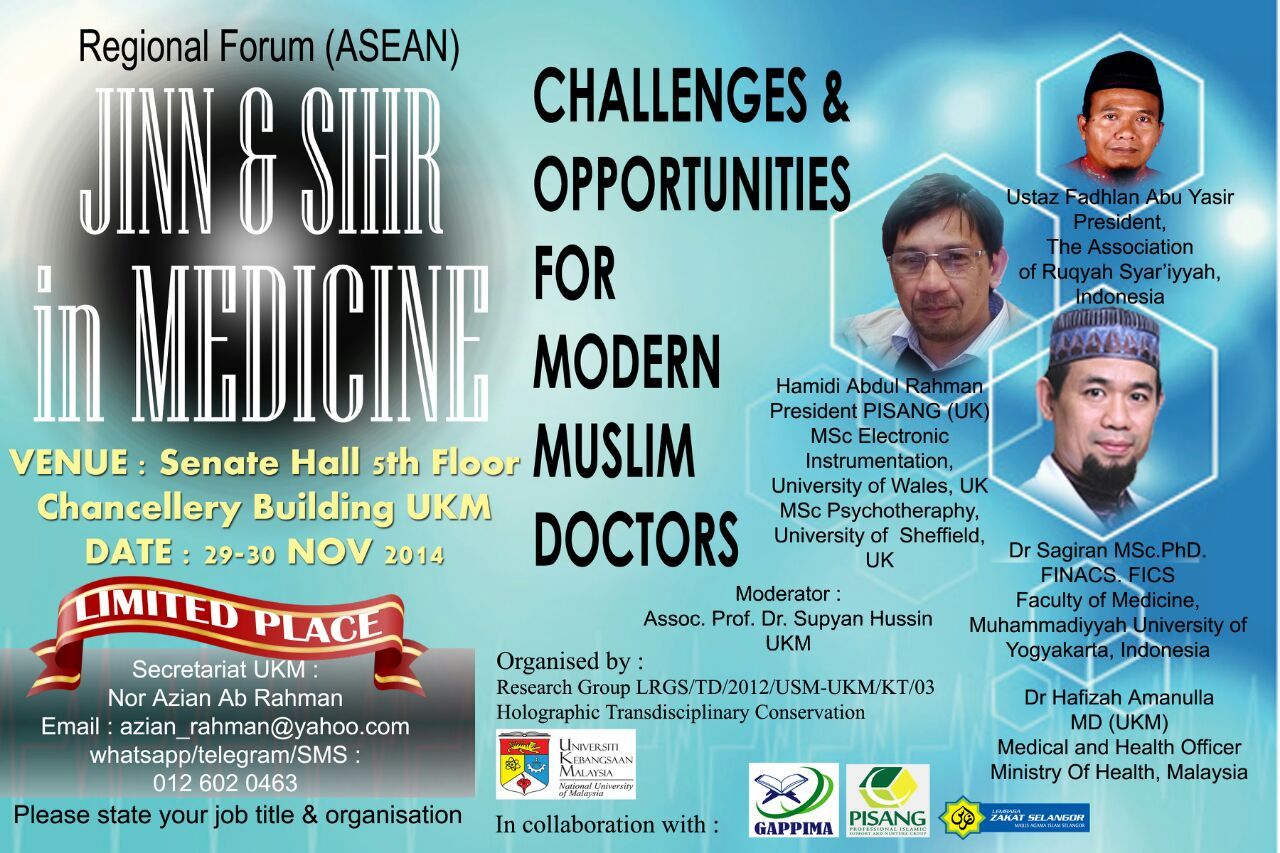KUALA LUMPUR, Nov 13 ― A supernatural approach involving djinns and black magic has no place in the modern healthcare system, local doctors have said ahead of a regional forum that aims to reconcile paranormal beliefs with medicine this month.
The doctors explained that modern healthcare bases itself on evidence-based medicine, and there must be a way to measure whether the supernatural approach actually works before it can even be considered.
“I understand and appreciate the efforts to introduce the concept of djinn, which is part of religious belief. However, I do not think that it is possible to have an evidence-based approach to djinn and black magic,” Dr Helmy Haja Mydin, an associate professor with University of Malaya Medical Centre, told Malay Mail Online.
“By definition, these are things that cannot be seen and cannot be measured. Without measurements, you cannot have data. How to measure belief?” he asked.
As with Dr Helmy’s views, Dr Krishna Kumar, the president of the Malaysian Medical Association (MMA), said evidence-based medicine required demonstrable causality in order to be effective.
“There must be something to show what causes the diseases or something that can cure it. Based on that, we treat them,” Dr Krishna said.
Formed in 1959, MMA is the main representative body for all registered medical practitioners, with over 14,000 members nationwide.
The Malay Mail Online reported over the weekend that the forum in Universiti Kebangsaan Malaysia (UKM) will feature several international faith healers, a surgeon from Indonesia, and a local medical officer to share their experiences in dealing with “supernatural cases” and “djinns” (genie).
Before the advent of modern medicine, black magic involving malevolent “makhluk halus” (fairies, or “supernatural beings”) such as djinns were often blamed by the Malay community for ailments that were then treated using exorcisms.
Historically, Malays would consult a bomoh or pawang, a shaman who mixes ancient pagan beliefs with Islamic teachings, but the role is now increasingly taken up by pseudo-scientific faith healers.
Dr Kok Sen Wai, a psychiatric medical officer based in Sarawak, said he has witnessed various illnesses — from seizures to schizophrenia — being treated as “djinn possession” or black magic by faith healers of different denominations, from Muslim imams, Taoist priests to Christian pastors.
“There are no codified and consistent signs and symptoms for possession or curses. The diagnosis seems to be made if the cleric ‘feels’ it is supernatural. Can you imagine if medicine is practised in the same way?” asked Dr Kok.
“Can an oncologist drop chemotherapy on you just because he has a ‘gut feeling’ it’s leukaemia? Or can a surgeon lop off half of your colon and have you defecate out of a colostomy bag for the rest of your life just because he ‘really, really thinks’ that you have colorectal carcinoma?”
Dr Kok insisted that should the rigorous standards that apply to conventional medicine be applied to the supernatural, the faith healings need to have documented, testable, and reproducible evidence that they do work.
“At current time, the sum of published evidence for confirmed illnesses caused by magic and spirits is at precisely zero,” Dr Kok told Malay Mail Online.
The medical officer warned that should supernatural causes be entertained as alternative diagnoses, these will become the default reading whenever a doctor cannot figure out a case.
“They can just wash their hands and call the witch doctors in to take over. It is the ‘god of the gaps’ equivalent of medical diagnoses. It can explain everything and thus, explain nothing,” he added.
Dr Helmy pointed out that there are subtle differences between treatments labelled Islamic faith healing and traditional medicine, noting that the Health Ministry is already looking into the feasibility of traditional medicine and its place in modern therapies.
“It is a good effort as it views interventions with an open mind and tries to ascertain if there is a place for its practice,” said the doctor, who specialises in respiratory and general medicine.
“It is essential to remain objective when looking at the evidence, and part of this should include appropriate and sufficient training for students and doctors on how to read and think critically when dealing with the deluge of data that is available out there.”
Dr Kumar also added that there are forms of traditional medicine that have been accepted in the field even when they were previously shunned, but only after continuous researches yielded results.
Dr Khoo Yoong Khean, the managing editor of online publication Malaysian Medical Gazette, said that holding a forum is still acceptable, although he was curious with the amount of money backing the event.
“Supernatural belief is pervasive in our community. It might be a good idea to discuss and see how we can understand the social factor in it, to make modern medicine more acceptable to the community.
“The greatest challenge for a modern doctor is not to diagnose anymore, it is to convince that our treatment works,” said Dr Yoong, who is now attached in primary care in rural Negri Sembilan.
The forum in UKM is organised by a Long-Term Research Grant Scheme (LRGS) group, one of the five which are part of a RM7 million five-year programme between Malaysia’s second-oldest university and Universiti Sains Malaysia (USM) compiling “local knowledge” under the theme of “healing”.
The forum, scheduled for November 29 and 30 is held in collaboration with the Federation of Islamic Medicine Practitioners' Associations (Gappima) and United Kingdom-based faith healing group Professional Islamic Support and Nurture Group (Pisang). It is funded by the Selangor Zakat Board.
Among the topics to be discussed are “black magic phenomena in medical cases” and “djinn possession in mental health disorder”.



















